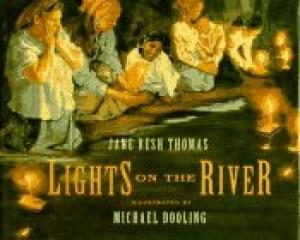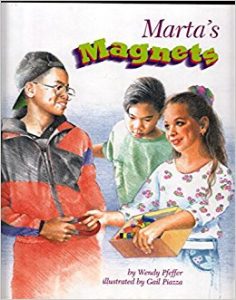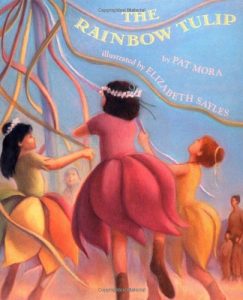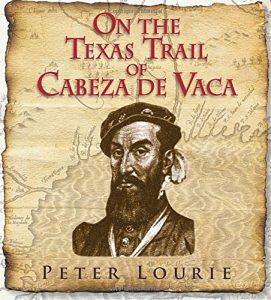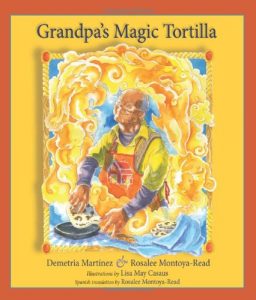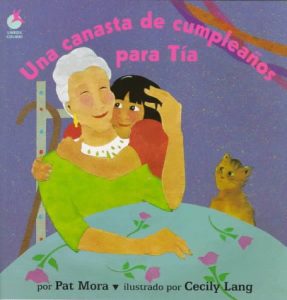 With the help and interference of her cat Chica, Cecilia prepares a surprise gift for her great-aunt’s ninetieth birthday.
With the help and interference of her cat Chica, Cecilia prepares a surprise gift for her great-aunt’s ninetieth birthday.
Author: Book Importer
Lights On The River
Marta’s Magnets
Snakes!: Strange and Wonderful
Provides a comprehensive look at the world of snakes through a presentation of the many types found around the world–reviewing their similarities, differences, and unique abilities.
The Rainbow Tulip
El Machinchar
On The Texas Trail Of Cabeza De Vaca
Grandpa’s Magic Tortilla
500 Anos del Pueblo Chicano/500 Years of Chicano History: In Pictures
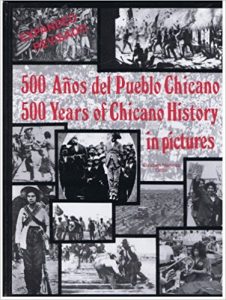 This bilingual pictorial history depicts the Mexican American/Chicano people from their origins 500 years ago with Columbus’ “discovery” and the invasions of the New World, to their struggles for social justice today. Over 800 photographs with brief explanatory texts tell the story of how Mexicans came to what is now the U.S. well before the Pilgrims and after the U.S. war of 1846-48, were made strangers in their own land. Elizabeth Martinez, author of books and articles on social movements, presents a vivid record of the life, culture, and collective struggles by farmworkers, miners, students, factory workers, women’s organizations, noted leaders, immigrants, and artists across the country. The faces of weathered workers, militant youth and beautiful children alternate with victims of lynchings and bloody repression to create a work of both pain and celebration. This updated edition should be of special interest, given today’s emphasis on multiculturalism, to teachers and students as well as the general public. The publisher, the SouthWest Organizing Project, is a community-based organization nationally known for its work on racial, social, and economic justice issues. Order from Southwest Community Resources, 211 10th St., SW, Albuquerque, NM 87102, 505-247-8832.
This bilingual pictorial history depicts the Mexican American/Chicano people from their origins 500 years ago with Columbus’ “discovery” and the invasions of the New World, to their struggles for social justice today. Over 800 photographs with brief explanatory texts tell the story of how Mexicans came to what is now the U.S. well before the Pilgrims and after the U.S. war of 1846-48, were made strangers in their own land. Elizabeth Martinez, author of books and articles on social movements, presents a vivid record of the life, culture, and collective struggles by farmworkers, miners, students, factory workers, women’s organizations, noted leaders, immigrants, and artists across the country. The faces of weathered workers, militant youth and beautiful children alternate with victims of lynchings and bloody repression to create a work of both pain and celebration. This updated edition should be of special interest, given today’s emphasis on multiculturalism, to teachers and students as well as the general public. The publisher, the SouthWest Organizing Project, is a community-based organization nationally known for its work on racial, social, and economic justice issues. Order from Southwest Community Resources, 211 10th St., SW, Albuquerque, NM 87102, 505-247-8832.
Karma
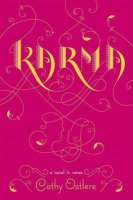
After her Hindu mother’s suicide, 15-year-old Maya and her Sikh father travel from Canada to India for a traditional burial. The year is 1984, and on the night of their arrival in New Delhi, Prime Minister Indira Gandhi is assassinated by her Sikh guards. When the city erupts in chaos, both Maya and her father find themselves in great danger. Through a sequence of horrifying events, father and daughter are separated, and Maya is left alone in a violent foreign country where she must rely on the help of strangers to reach safety.
See the review at WOW Review, Volume 4, Issue 1

